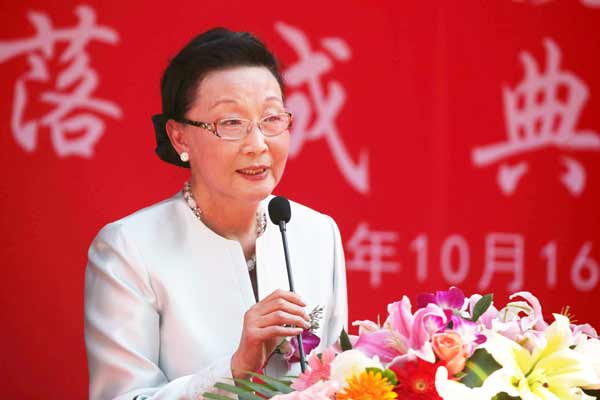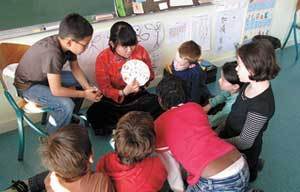Fang delivers a new base for Chinese language study
 |
|
Florence Fang says the dedication of the building she donated to Peking University to teach Mandarin to foreign students is the fulfillment of an important part of her China dream. Wang Jing / China Daily |
It was more than a ribbon-cutting ceremony for Florence Fang, who was present for the dedication of the building she donated to Peking University to teach Mandarin to foreign students. It was the fulfillment of an important part of her China dream.
"I had dreamed of becoming a student of Peking University at a quite early age, and I hope the completion of the building will contribute to promoting Chinese culture to the entire world," Fang said on Oct 16 in Beijing as more than 150 people, including representatives from the university and from San Francisco and Oakland, California, attended the celebration of the Florence Lee Fang Building for the School of Chinese as a Second Language.
The Chinese-American entrepreneur and activist in the United States has devoted herself to China's educational development. Fang, who has successfully managed multiple businesses, including being the former publisher of the San Francisco Examiner, is the chairwoman of the Florence Fang Family Foundation.
She was named the California Woman of The Year, in 1990 and 2003. In 2006, she donated $3 million to the University of California Berkeley's East Asian Library. She is an honorary trustee at Peking University, and an honorary trustee and an honorary professor at Wuhan University, to which she gave about $100,000 in 2008.
In 2010, Fang was the only Chinese entrepreneur who worked in support of the "100,000 Strong Initiative", which was announced in 2009 by US President Barack Obama - an effort to increase the number of American students studying in China to 100,000 over four years.
In 2010, then-Secretary of State Hillary Clinton formally launched the initiative in Beijing. Now known as "The 100,000 Strong Foundation" and established through the support of the Ford Foundation, Fang's foundation and a half-dozen other funders, it has been supported by the Chinese government with scholarships for Americans to study in China.
The Fang foundation's goal is to bridge the gap between cultures, strengthen the US-China economic and strategic relationship, and enhance global stability.
"The 21st century is a century of internationalization, and the Chinese language becoming international is an inevitable trend," Fang says. "The School of Chinese as a Second Language plays an important role in promoting cooperation between China and other countries."
Teaching Chinese as a second language started at Peking University in 1952. Among 40 internationally acclaimed people who have studied in China, 60 percent chose to study at the Peking University, including Timothy Geithner, the former US Treasury secretary, and Barry Marshall, who was awarded the Nobel Prize in Medicine in 2005.
The School of Chinese as a Second Language as a research and teaching center was established at Peking University in 2002.
Wang Enge, president of Peking University, says the Florence Lee Fang Building will improve the environment of the language school and help promote Chinese as an international language. "I believe the completion of the building will become a warm home and academic center for those who are interested in the Chinese language," Wang says.
Jean Quan, the first woman and the first Asian-American to be elected mayor of Oakland, California, says Florence Fang has set an example for all Chinese living overseas.
"She never forgets that she is a daughter who belongs to China, and even if she does not live in China, she considers the country's development," Quan says. "If everyone had that same consideration, the world will become a better place."
Quan says she hopes the Florence Lee Fang Building will become a home to many international leaders, just as Peking University established itself for many influential people and others who wanted to speak Chinese.
She says because it is not possible for all US students to go to China to study Chinese, an exchange program with Chinese-language teachers should be set up.
Xu Jingning, a teacher at the School of Chinese as a Second Language, says the new building has improved her work environment and given her and her students many conveniences. "Previously, we didn't have our own office and students didn't have their space, but now, we have," Xu says.
|
|
|


















